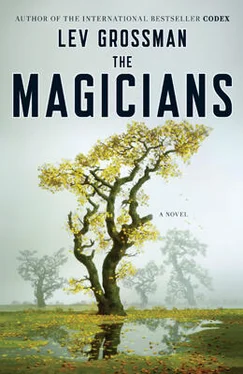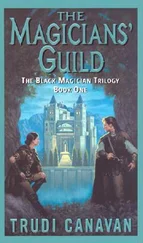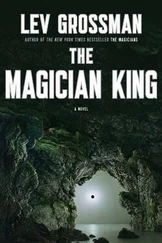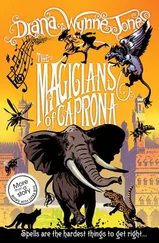Fogg was talking again, but now Quentin wasn’t even listening. He had begun to recite something under his breath, something familiar. It took him a second to realize that the words he was mouthing weren’t English; they were from the foreign language he had invented earlier that afternoon. It was an obscure language — he’d decided — indigenous to a single tropical archipelago, a languorous hot-weather paradise, a Gauguin painting, blessed with black sand beaches and breadfruit trees and freshwater springs and endowed with an angry, glowing red volcano god and an oral culture rich in obscene expletives. He spoke this language fluently, with no accent, like a native. The words he spoke were not a prayer, exactly. More of an incantation.
Quentin stopped shuffling the cards. There was no going back. Everything snapped into very slow, slow motion, as if the room had filled up with a viscous but perfectly clear liquid in which everyone and everything floated easily and calmly. Everyone and everything except for Quentin, who moved quickly. With two hands together, as if he were releasing a dove, he tossed the deck of cards lightly up to the ceiling. The deck broke apart and scattered in flight, like a meteorite losing cohesion in the atmosphere, and as the cards fluttered back down to earth they stacked themselves on the tabletop. They formed a house of cards. It was a recognizable, if impressionistic, model of the building they were sitting in. The cards fell as if by chance, but each one perfectly, snapping into place magnetically, edge to edge, one after other. The last two, the aces of spades and hearts, leaned up against each other to make the roof over the clock tower.
Now the room was absolutely still. Dean Fogg sat as if he were frozen in place. All the hairs were standing up on Quentin’s arms, but he knew what he was doing. His fingers left almost imperceptible phosphorescent trails behind them in the air. He definitely felt high. He leaned forward and blew lightly on the card house, and it collapsed back down into a neatly stacked deck. He turned the deck over and fanned it out on the table like a blackjack dealer. Every card was a Queen — all the standard suits, plus other suits that didn’t exist, in different colors, green and yellow and blue. The Queen of Horns, the Queen of Clocks, the Queen of Bees, the Queen of Books. Some were clothed, some were shamelessly naked. Some of them had Julia’s face. Some of them had the lovely paramedic’s.
Dean Fogg watched Quentin intently. Everybody watched him. Watch this: Quentin squared the deck again and with no particular effort ripped it in half and then ripped the halves in half and tossed the resulting confetti at the assembled company, who all flinched except for Fogg.
He stood up. His chair fell over backward.
“Tell me where I am,” Quentin said softly. “Tell me what I’m doing here.”
He picked up the stack of nickels in his fist, only it was no longer a stack of coins, it was the hilt of a bright, burning sword that he drew easily out of the tabletop, as if it had been left there buried up to the hilt.
“Tell me what’s going on here,” Quentin said, louder, to the room. “And if this place isn’t Fillory, then for fuck’s sake will somebody please tell me where the hell I am?”
Quentin let the tip of the sword hover under Fogg’s nose for a slow ten-count, then he reversed his grip and stabbed it down into the wood of the table. The point bit deep into the buttery wood and stuck there.
Fogg didn’t move. The sword waggled in place. Quentin sniffed involuntarily. The last of the light from the window died. It was night.
“Well now,” the Dean said finally. He removed a neatly folded handkerchief from his pocket and patted his forehead. “I think we can all agree that that was a Pass.”
Somebody — it was the old guy with the knots — put a reassuring hand on Quentin’s back and gently, with surprising strength, drew the sword out of the table and laid it safely on its side. A slow patter of applause arose from the assembled examiners. It quickly turned into an ovation.
Afterward Quentin couldn’t remember much of the rest of that night, except that he spent it there at the school. He was exhausted, and weak, like he’d been drugged. His chest felt hollowed out and empty. He wasn’t even hungry anymore, just desperate to sleep. It was embarrassing, but nobody seemed to mind. Professor Van der Weghe — it turned out that was the dark-haired woman’s name — told him it was perfectly natural to be tired because he had just cast his first Minor Incantation, whatever that was, and that would wear anybody out. She further promised him that matters had been squared with his parents. They wouldn’t be worried. By that point Quentin barely cared, he just wanted to pass out.
He let her half lead, half carry him up approximately ten thousand flights of stairs to a small, neat room containing a very, very soft featherbed with cool white sheets. He lay down on it with his shoes still on. Ms. Van der Weghe took them off for him — it made him feel like a little kid to have somebody untie his shoes for him. She covered him up, and he was asleep before she closed the door.
The next morning it took him a long, confused minute to figure out where he was. He lay in bed, slowly piecing together his memories of the day before. It was a Friday, and by rights he should be in school now. Instead he was waking up in an unfamiliar bedroom wearing yesterday’s clothes. He felt vaguely confused and regretful, like he’d drunk too much at a party with people he didn’t know very well and fallen asleep in the host’s spare bedroom. He even had a trace of what felt like a hangover.
What exactly had happened last night? What had he done? His memories were all wrong. The events were like a dream — they had to be — but they didn’t feel like a dream. And this room wasn’t a dream. A crow cawed loudly outside and immediately stopped, as if it were embarrassed. There was no other sound.
From where he lay he took stock of the room he was in. The walls were curved — the room was in the shape of a section of a circle. The outer wall was stone; the inner was taken up with dark wooden cabinets and cubbies. There was a Victorian-looking writing desk and a dresser and a mirror. His bed was tucked into a wooden alcove. There were small vertical windows all along the outer wall. He had to admit it was a highly satisfactory room. No danger signs yet. Maybe this wasn’t a complete disaster. At any rate it was time to get up. Time to get it over with and find out what was going on.
He got up and padded over to a window. The stone floor was cool on his bare feet. It was early, a misty dawn, and he was very high up, higher than the tops of the highest trees. He had slept for ten hours. He looked down on the green lawn. It was silent and empty. He saw the crow: it drifted by below him on glossy blue-black wings.
A note on the desk informed him that he would be having breakfast with Dean Fogg at his earliest convenience. Quentin discovered a dormitory-style bathroom on the floor below, with shower stalls and rows of capacious white porcelain sinks and stacks of neatly folded scratchy white institutional towels. He washed up — the water was hot and strong, and he let it blast him till he felt clean and calm. He took a long pent-up acid-yellow piss in the shower and watched it spiral down the drain. It felt deeply weird not to be in school, to be on an adventure somewhere new, however dubious. It felt good. A mental meter in his brain was totting up the damage that his absence would be wreaking at home in Brooklyn; so far it was still within acceptable limits. He made himself as presentable as possible in his day-old, slept-in interview suit and walked downstairs.
Читать дальше












